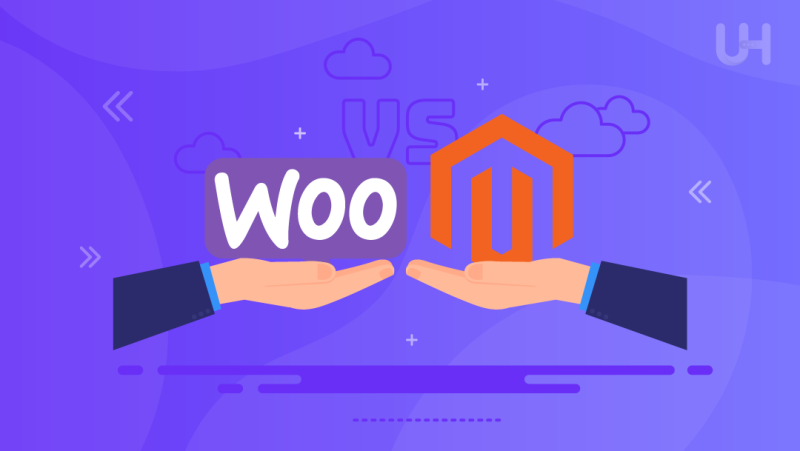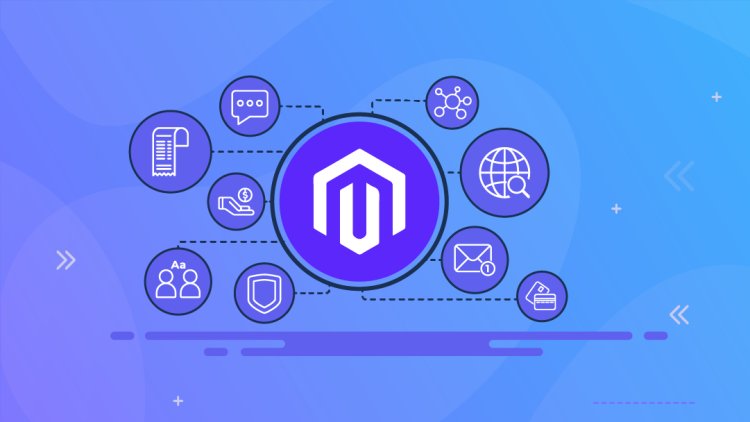WooCommerce vs. Magento is a common debate these days. In online business, choosing the best eCommerce platform is essential to make your business successful. However, this article examines every entrepreneur’s critical yet most challenging decision: WooCommerce vs. Magento. We’ll offer an informed comparison to help you select the best eCommerce solution for your business requirements.
Magento, an eCommerce powerhouse renowned for scalability and sophisticated capabilities, vs. WooCommerce, known for its affordability and user-friendliness. Our comprehensive guide will clarify the benefits and drawbacks of each, assisting you in navigating the complex process of making an informed choice.
So, let’s get started!
Understanding eCommerce Platforms
eCommerce platforms serve as the digital backbone for businesses, facilitating online sales and customer interactions. To harness their full potential, it’s essential to understand the fundamental aspects of these platforms.
What Are eCommerce Platforms?
eCommerce platforms are software solutions that enable businesses to establish and manage their online presence for selling products or services. These platforms encompass tools and features designed to create, customise, and optimise online stores. Moreover, they offer a centralised hub for businesses to showcase products, process transactions, and manage inventory, among other crucial functions.
When considering your eCommerce venture, remember that reliable hosting services and specialized WordPress-hosting are essential to ensure seamless operations and a successful online presence.
Significance of Platform Selection
The choice of an eCommerce platform can profoundly impact the success of your online business. Selecting the wrong platform may lead to technical challenges, scalability issues, or budgetary constraints. On the other hand, choosing the right platform empowers you to create a seamless and secure shopping experience for your customers.
Factors to Consider When Choosing an eCommerce Platform
- Business Objectives: Define your business goals and growth projections to align with the platform’s capabilities.
- Budget: Evaluate the initial setup costs, ongoing expenses, and potential return on investment.
- Technical Proficiency: Assess your team’s ability to effectively manage and customise the platform.
- Scalability: Consider your business’s growth potential and whether the platform can accommodate it.
- Flexibility: Determine the customisation and flexibility required to meet your unique business needs.
- Third-party Integrations: Identify the external tools and integrations essential for your business operations.
- User Experience: Prioritize a user-friendly interface and design for an optimal customer experience.
- Support and Community: Explore the availability of support resources and a robust user community.
Is E-Commerce Hosting Important for a successful online business?
eCommerce hosting is vital as it directly impacts website performance, security, and customer experience. Ultahost’s eCommerce hosting supports both WooCommerce and Magento solutions, ensuring fast loading times, robust security features, and seamless transactions. Choosing the right hosting provider is a critical decision for the success of your online store.
WooCommerce: An In-Depth Look
WooCommerce, a WordPress plugin, is a user-friendly eCommerce solution renowned for its accessibility. It empowers entrepreneurs and small to medium-sized businesses to establish an online presence with minimal hassle. Moreover, WooCommerce’s simplicity in installation and setup makes it an attractive choice.
Advantages of Using WooCommerce
1. User-friendliness
WooCommerce’s adaptability and interface simplify product management, order processing, and inventory control. Business owners can efficiently manage their online stores without a steep learning curve.
2. Cost-Effectiveness
One of WooCommerce’s primary appeals is its affordability. It’s an open-source platform, meaning no licensing fees, making it budget-friendly for startups and a good fit for small businesses.
3. Wide Range of Extensions
With many WordPress e-commerce plugins and extensions available, WooCommerce offers extensive customisation options. This versatility allows businesses to tailor their eCommerce sites to meet unique requirements.
Limitations of WooCommerce
1. Scalability Concerns
While excellent for small to medium-sized businesses, WooCommerce may face scalability challenges when handling substantial product catalogues or high traffic volumes.
2. Limited Built-in Features
Unlike Magento, WooCommerce offers fewer built-in features and functionalities. Businesses may need additional plugins for advanced features, potentially leading to increased complexity.
Magento: An In-Depth Look
When considering an eCommerce platform, Magento emerges as a robust contender favoured by businesses of various scales. Let’s dive into the details of Magento to help you assess its suitability for your business needs.
Introduction to Magento
Magento, an open-source eCommerce solution, has gained popularity for its strength and adaptability. It primarily aims for mid-sized to large organisations and provides various features to fulfil online businesses’ complicated demands.
Advantages of Magento
1. High Scalability and Performance
Magento shines in its ability to handle large product catalogs and high traffic volumes. Its architecture is built to scale, ensuring your online store can grow seamlessly as your business expands.
2. Robust Built-in Features
Magento boasts a rich set of built-in features, covering aspects like inventory management, advanced SEO, and marketing tools. This feature set minimizes the need for extensive third-party integrations.
3. Ideal for Large and Complex eCommerce Operations
Magento’s feature set is tailored to your requirements if you operate a diverse product catalog, support multiple storefronts, or cater to B2B customers.
Limitations of Magento
1. Steeper Learning Curve
Due to its advanced feature set, Magento has a steeper learning curve than other platforms. This may necessitate additional time and resources for training.
2. Higher Initial Cost
While Magento offers a free, open-source version, there are associated costs for hosting, development, and potentially premium extensions. This can make it a more substantial initial investment.
Key Factors in Choosing Between WooCommerce and Magento
Selecting the ideal eCommerce platform necessitates examining the key factors, each critical in shaping your digital storefront. Whether you’re a budding startup or an established enterprise, making the right choice is vital for long-term success.
Business Size and Scalability Needs
Assess your business’s current size and future growth prospects. WooCommerce often suits small to medium-sized enterprises with modest product catalogs and traffic.
Conversely, Magento excels when handling substantial inventories and anticipating robust expansion. Consider the scalability your business demands.
Budget Considerations
Budget constraints play a crucial role in platform selection. WooCommerce, being cost-effective and open-source, offers an advantage for businesses with limited budgets.
On the other hand, Magento, while robust, may require a more substantial initial investment, making it a preference for financially capable ventures.
Technical Expertise and Resources
Evaluate your team’s technical proficiency and available resources. WooCommerce’s user-friendly interface makes it accessible to those with basic web development skills.
Magento, however, demands a higher level of technical expertise due to its complexity. Ensure your team can manage your chosen platform effectively. Additionally, to ensure the security of your online store, consider implementing SSL certificates to safeguard customer data and build trust.
Customization and Flexibility Requirements
Examine your customization needs. WooCommerce boasts a wide range of plugins and extensions for flexibility, making it a versatile choice. Magento, meanwhile, offers unparalleled customization capabilities, making it suitable for intricate and unique eCommerce setups.
Third-party integrations and Extensions Needed
Consider the third-party integrations and extensions essential for your business operations. Both platforms offer extensive libraries, but your specific requirements may influence your decision.
User Experience and Design Preferences
Your customers’ experience matters. WooCommerce allows quick setup and customization, ideal for businesses needing a swift online presence.
Magento provides more advanced design possibilities for businesses with a distinct aesthetic vision. Ensure your chosen platform aligns with your brand’s identity.
Support and Community Resources
Evaluate the availability of support and community resources. WooCommerce benefits from a vast user community, ensuring ample troubleshooting assistance. Magento, backed by Adobe, offers premium support for critical issues.
Considering these factors, you’ll be well-equipped to choose between WooCommerce and Magento, tailoring your eCommerce solution to your business’s unique needs and goals.
Features Comparison
In the eCommerce platform showdown, a feature-by-feature comparison between WooCommerce and Magento is crucial for informed decision-making. So, let’s get in!
Core Features
WooCommerce offers user-friendly essentials like product management and checkout options, while Magento suits complex operations with advanced features such as inventory management.
Customization
WooCommerce provides flexibility through extensions and plugins, while Magento demands more technical expertise.
SEO and Marketing
Both platforms are SEO-friendly, but Magento offers richer SEO capabilities out of the box.
Themes
WooCommerce has a wide variety of themes, while Magento’s themes are often more intricate.
Mobile Responsiveness
Both Magento and WooCommerce prioritize mobile-friendliness.
The Final Verdict
The decision between WooCommerce and Magento holds a lot of weight in eCommerce. It is clear from this comprehensive guide’s conclusion that the choice depends on knowing your company’s particular requirements.
The advantages of WooCommerce, with its user-friendliness and cost-effectiveness, make it an appealing choice for small to medium-sized enterprises seeking rapid setup and straightforward management. On the other hand, Magento’s robust features and scalability cater to larger, complex operations.
By prioritizing factors such as budget, technical resources, and customization requirements, you can confidently select the platform that aligns with your vision. Remember, this decision is not set in stone; it should evolve with your business.
Hope you liked this comprehensive guide on eCommerce platform selection. Hosting plays a pivotal role; consider Ultahost for reliable, high-performing eCommerce solutions. Your online success awaits.
FAQs
No, the choice depends on your unique business requirements. Careful consideration of your specific needs will help determine the better fit.
’Factors to consider include business size, budget, technical expertise, customization needs, third-party integrations, design preferences, and support resources.
WooCommerce vs. Magento depends on your business’s specific needs. WooCommerce suits small to medium-sized ventures, while Magento is ideal for large, complex e-commerce operations.












